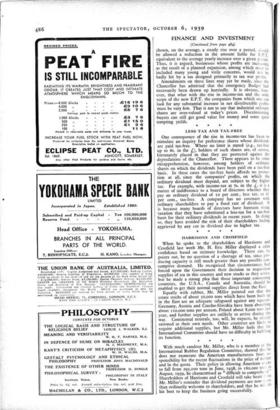LESS TAX AND TAX-FREE
_One consequence of the rise in income-tax has been to stimulate an inquiry for preference shares whose dividends are paid tax-free. Where no limit is stated (e.g., tax-free up to 6s. in the L), holders of such shares are, of course, fortunately placed in that they are protected against the depredations of the Chancellor. There appears to be some misapprehension, however, among holders of ordinary shares on which the dividends have been paid on a tax-free basis. In these cases the tax-free basis affords no protec- tion at all, since the companies' profits, on which the ordinary dividend must depend, are subject to the higher tax. For example, with income-tax at 7s. in the L, it is a matter of indifference to a board of directors whether they pay an ordinary dividend of to per cent., less tax, or 61; per cent., tax-free. A company has no covenant with ordinary shareholders to pay a fixed rate of dividend. It is because many boards of directors have foreseen rising taxation that they have substituted a less-tax for a tax-free basis for their ordinary dividends in recent years. In doing so, they have avoided the risk of their shareholders feeling aggrieved by any cut in dividend due to higher tax.
* * * *


































 Previous page
Previous page